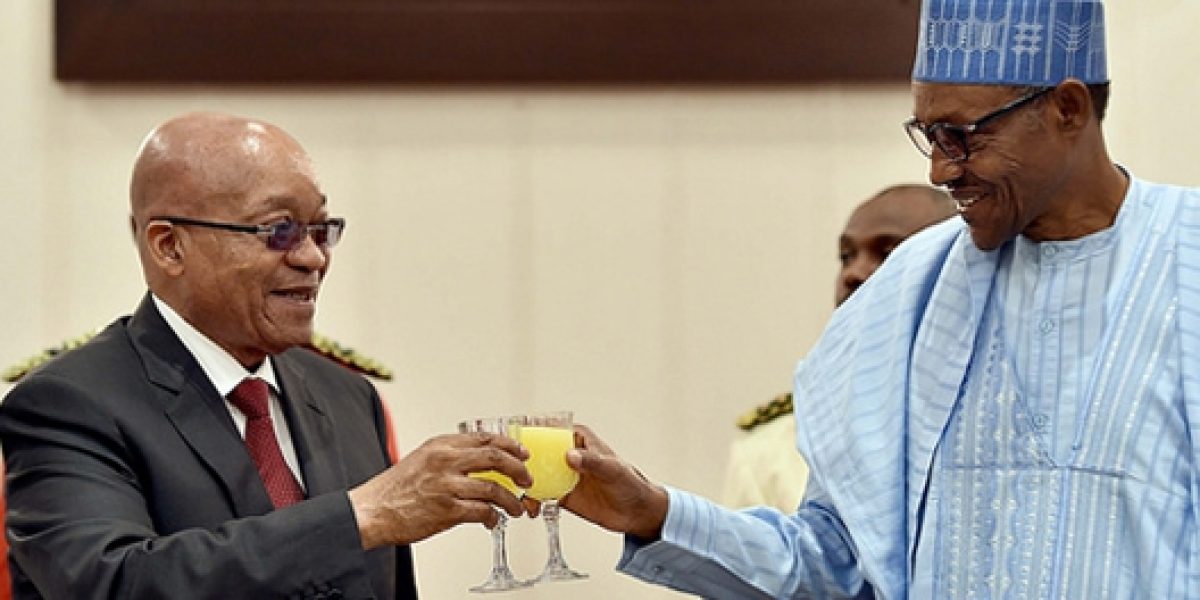The visit, the first for President Zuma since President Muhamadu Buhari took power in peaceful and democratic elections in 2015, had been highly anticipated.
South Africa is the largest buyer of Nigeria’s oil in Africa, and over 120 South African businesses operate there. There should be greater impatience with the fact that the heads of states of these two countries interact sporadically. Recent developments in what ought to be Africa’s most important bilateral relationship might have accelerated the need for the presidents of Africa’s first (Nigeria) and second (South Africa) largest economies to meet and reboot the relationship.
Certainly, a list of issues have been weighing the relationship down, including the Federal Governments’ decision last year to slap MTN, South Africa’s largest investor in Nigeria, with an unprecedented fine of USD$ 3.9 billion for non-compliance with federal legislation. MTN has since the visit of President Zuma offered a ‘good faith’ settlement of USD$ 250 million. Moreover, the visit was also significant in light of South Africa’s open displeasure with a perceived lack of co-operation on the part of Nigerian authorities when in September 2014 a guesthouse belonging to prominent pastor TB Joshua collapsed in Lagos, killing 86 South Africans. Relations have also been soured by Nigeria’s concern with South Africa’s visa regime when it comes to Nigerians, including xenophobic attacks on foreigners in South Africa.
Without doubt, all indications are that President Zuma, through his interactions – including a joint press conference with President Buhari, and his speech to the joint session of parliament – did manage to woo his hosts and re-orient the relationship towards a new era.
Specifically, the latter was an important marker to structure actions around broader continental objectives such as peace and security. After all, Nigeria-South Africa relations are not just about the 30-plus bilateral agreements and memoranda of understanding that govern the relationship between the two countries. As two of Africa’s largest economies and leading democracies, they should pivot towards solving Africa’s multitude challenges.
Thus in line with an earlier tone, set by former Presidents Thabo Mbeki and Olusegun Obasanjo in the early 2000s, in his address to parliament President Zuma’s message was not only focused on dealing with issues in the bilateral relationship. While recalling Nigeria’s leadership in Africa, and support for freedom in South Africa, significant emphasis was placed on the necessity for co-leadership on the African Agenda.
But this can only happen by instituting a Pretoria-Abuja axis in the ‘African Agenda’. Even if Nigeria and South Africa are going through unprecedented domestic challenges, building blocks for co-leadership should be erected.
Yes, South Africa’s domestic economic outlook is bleak, with the International Monetary Fund projecting growth for this year at 0.7%. This is further compounded by the potential unravelling of its 1994 political model of tolerance – with racism, xenophobia, crime, state capture by factional interests and social exclusion embedding in the system.
Nigeria, an exemplary political transition in 2015 notwithstanding, has been facing an economic meltdown due to historically low oil-prices and an unending Islamic militant insurgency driven by Boko Haram in the north-eastern part of the country. Irrespective of challenging domestic contexts that are undermining the potential for robust leadership on the continent, Africa’s progress toward greater integration cannot take place without pro-active regional and continental policies in Pretoria and Abuja.
While South Africa has consistently stretched its diplomacy to deal with African problems, Nigeria’s Africa policy has been going through ebbs and lows over the past two decades resulting in greater insularity and focus on the domestic security and economic situation.
However, with President Zuma’s visit to Nigeria and a commitment to work closely with Nigeria in delivering the African Agenda, a new window of opportunity has been opened. Both countries must seize it.
As maturing African democracies, pitfalls in the bilateral relationship should not impact negatively on the ability of the two states to co-operate through bilateral channels on multilateral issues, including through the United Nations system and the African Union. With both countries currently serving as members of the African Union Peace and Security Council, a crucial starting point exists in that platform to intensify consultations, and develop common positions on African peace and security concerns.
Moreover, and in light of the increasing trade and investment opportunities between the two countries in various sectors, including the automotive industry, the Binational Commission might need greater institutionalisation, of which the objective should be pro-active identification, management and leadership on the issues that stunt the pace of implementation of bilateral agreements and commitments. This could be led by experienced special envoys or at the deputy ministerial level.
As Africa’s largest economies, the presidents of Nigeria and South Africa should speak and meet frequently at the level of working visits. It should not take a year after the inauguration of a president in South Africa or Nigeria before a substantive meeting takes place between the two heads of state. On the contrary, for a newly elected Nigerian or South African president, a working visit should feature in the first month after the inauguration. Also, it should be a standard practice for the two leaders to consult and to meet on the sidelines of multilateral gatherings.
Establishing such traditions is necessary to develop habits and reflexes of working together between the two administrations. They can be useful in pro-actively delivering solutions to the challenges facing the regions in which the two countries operate, including Africa at large.








